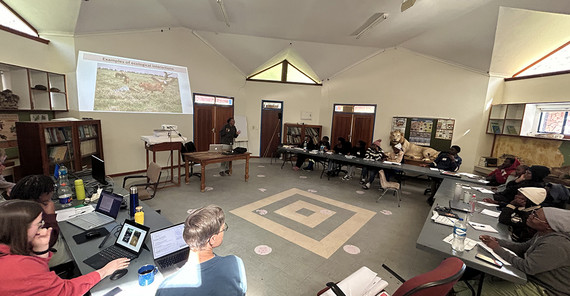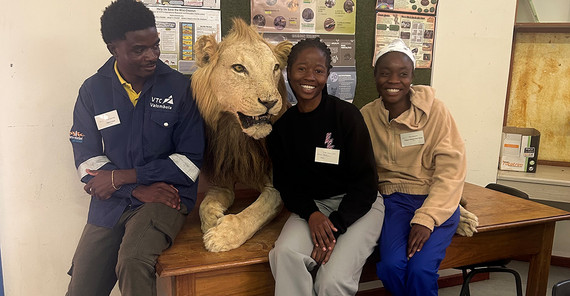Following the lecture, we engage in a challenging, yet enjoyable group exercise focused on rangeland management as a SES. Each group identifies and discusses key influencing factors such as overgrazing, financial pressure on farmers, cooperation between stakeholders, bush encroachment, and vegetation cover. We then work on developing feedback loops and management strategies that can either prevent or trigger tipping points. The exercise highlights the complexity and interconnection of ecological and social processes and emphasizes that rangelands must be understood and managed as integrated social-ecological systems.
After lunch, Dr. Clara Nesongano leads an interactive session on biodiversity assessment. Together, we explore the concept of biodiversity, methods of its assessment, and its vital role in maintaining ecosystem services-especially under changing climatic conditions. The session encourages us to think critically about how biodiversity supports ecosystem resilience and sustainability.
Next, Dr. Mark Bilton, NamTip’s local coordinator, gives an engaging lecture on research design, focusing on how to conduct effective scientific research. He stresses the importance of clearly defining the research question, understanding the system under investigation, and selecting appropriate scales and methods. His core message is clear: “Don’t try to answer everything-answer a good question well.”
PhD student Lisa-Maricia Schwarz, from the University of Potsdam, follows with a session on assessing the degradation state of the grass layer. She introduces us to key indicators of rangeland condition, including soil surface loss and degradation, ground cover, productivity, perennial grass abundance, exotic and invasive species, and plot-scale indicators. These measurable criteria provide a snapshot of rangeland health and inform management actions.
To conclude the day, Katrin Zimmer delivers a lecture on assessing the degradation state of the soil layer. She emphasizes the critical role of soil in ecosystem functioning, particularly the importance of soil organic carbon stocks as a key indicator of soil health. She also introduces us to the World Reference Base for Soil Resources (WRB), an international soil classification system that provides a standardized framework for describing and comparing soils globally.
Link to NamTip website:https://www.uni-potsdam.de/en/namtip


